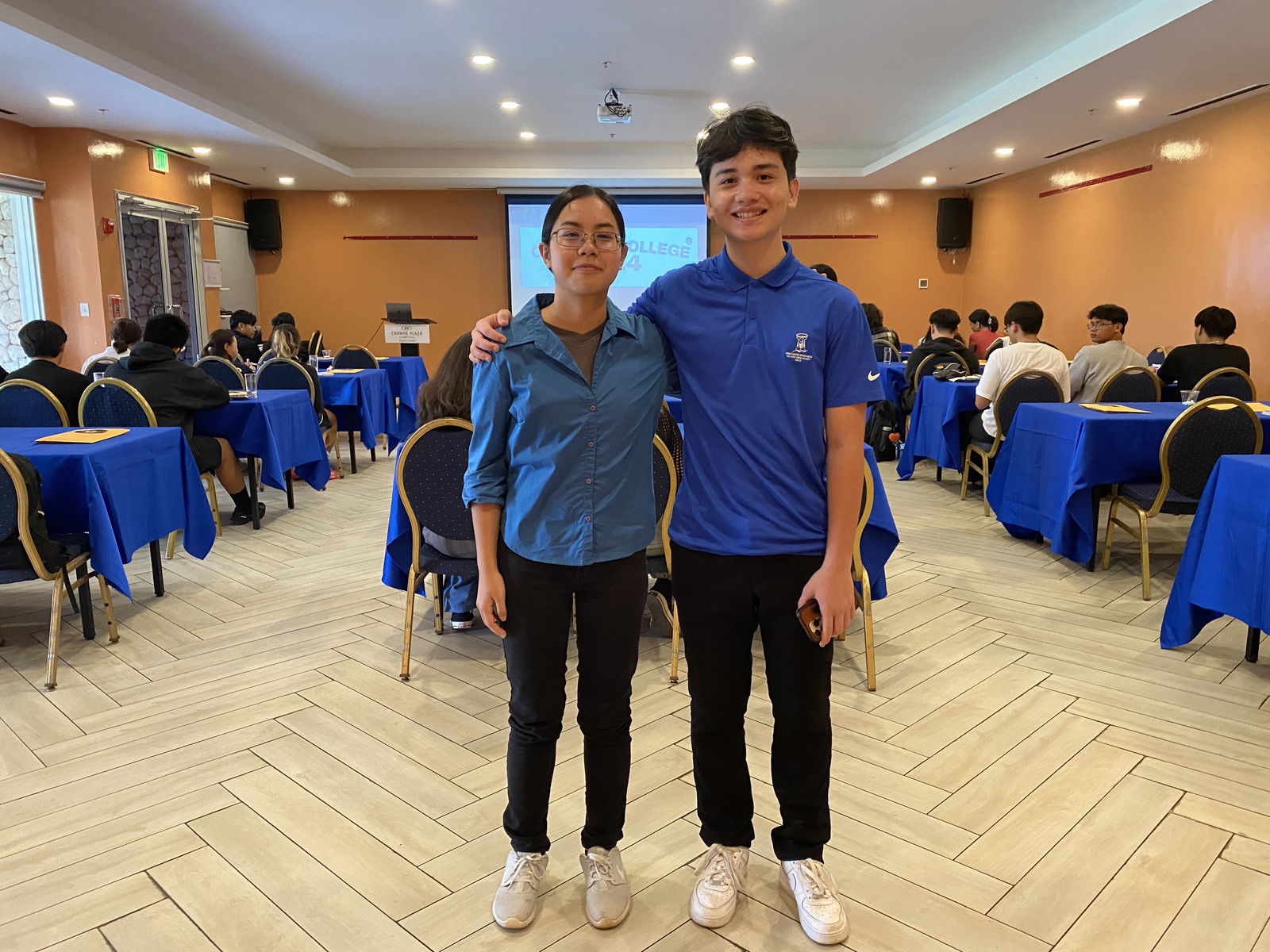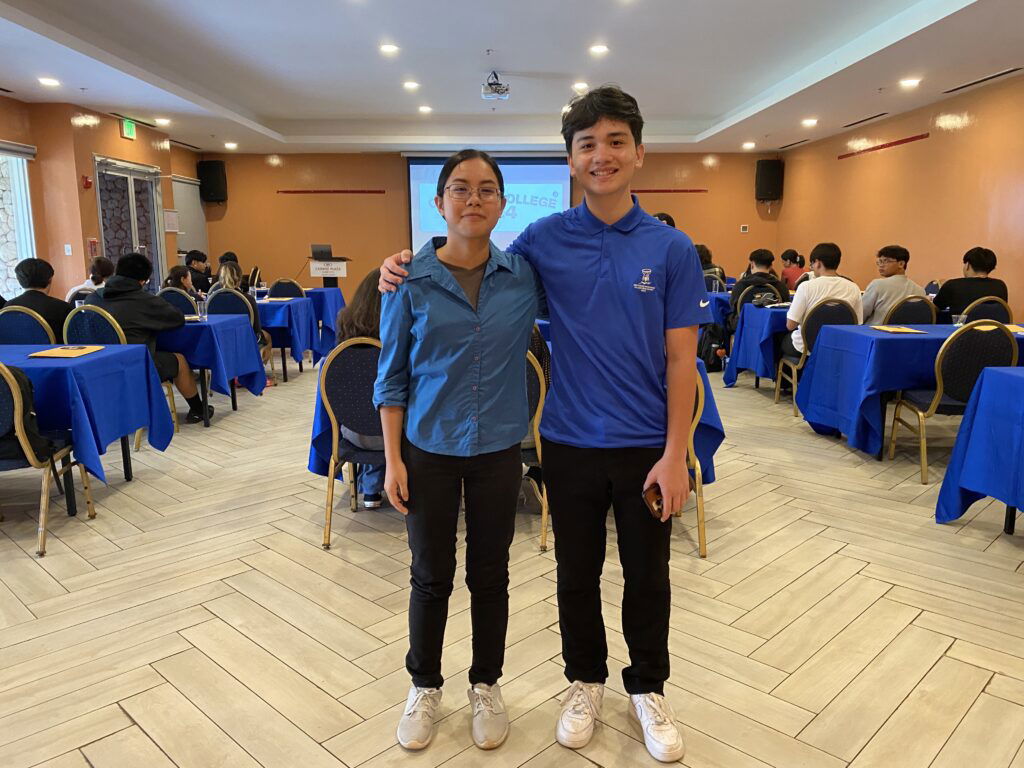
Yuri Sasamoto, left, and Jesse Sablan, pose for a photo before the start of a college application workshop they conducted earlier this month. The two are incoming sophomores at Columbia University.
YURI Sasamoto and Jesse Sablan, two incoming sophomores at Columbia University in New York, recently sat down with Variety to offer general advice to CNMI high school students interested in attending college in the states.
Sasamoto was the Class of 2023 valedictorian at Mount Carmel School while Sablan was Saipan International School’s valedictorian that same year.
Earlier this month, they conducted a free workshop for 35 island students and offered tips and best practices when applying to college.
At Variety’s request, they offered an abridged version of their advice to share with the public.
Sablan and Sasamoto said in freshman year, students should begin participating in extracurricular activities they find enjoyable.
Grade point average is important, but Sablan said extracurriculars show an “involved student.”
“If you are a freshman or a sophomore, we suggest definitely getting involved in activities you enjoy so that your application seems very strong and it shows you are a very outgoing person,” he said. “Colleges want students to make a difference in their campus and they want students who will make waves within their student community.”
The experience and awards they collect as part of their extracurriculars will be collected on the Common App, which hosts the applications of thousands of colleges throughout America, including Columbia University.
The Common App allows applicants to list up to 10 activities, Sablan said.
“We advise freshmen and sophomores who are just beginning high school to join a lot of activities they do enjoy, not just to have it there, but because it does reflect who they are, what their interests are, and what they’re passionate about,” Sasamoto said.
She pointed out that although she knew she wanted to get into a STEM field in college, she still pursued Youth Congress and Theater Club because of a genuine interest in those activities.
In junior year, students should consider the climate and geographic location of certain colleges they see themselves attending.
Climate and location are going to play a factor in the success of a student. Sasamoto said one must avoid overlooking how these factors play into the college experience.
“The environment and the culture of where that college is located really impacts how your college experience will be and it’s definitely something to consider,” she said. “Most people will decide on a college and then when they get there, they might find they don’t really enjoy living there versus attending school there.”
“It’s very important to pick a place you like to live in. If you don’t like the cold don’t go to Maine, but if you don’t like the heat don’t go to California,” Sablan said. “If you want to thrive really well in school pick a place that will support that.”
High school juniors should figure out the major they want to pursue and the school they want to go to. For example, a student who can handle winter and wants to study STEM could pursue those studies at MIT or conversely, a student who wants to do STEM but wants to live in a warm climate can pursue a degree at the California Institute of Technology.
The summer before senior year is the time to put together a college application on the Common App. Sasamoto and Sablan solicited letters of recommendation in time for a November early application to Columbia. There are also personal statements and supplemental essays for which they began brainstorming as part of the Common App.
Throughout their first semester as high school seniors, in addition to their classes, they were also putting work into their college applications.
Sablan said one must be prepared for multiple writing prompts. He said in general, colleges will expect a personal statement and will offer a number of writing prompts an applicant can respond to. Applicants only need to respond to one, which in general will ask the applicant to talk about their accomplishments or defining moments in their life.
There are also supplemental questions that vary from college to college.
“There are more specific questions like ‘why did you choose your major?’ [or] ‘why do you want to go to our school?’ or fun questions like ‘if you were a type of sauce what would you be?’ or ‘if you were a snack what would you be?’”
As for financing college, there are scholarships offered in many colleges, as well as federal and state scholarships. But a student must not let finances hold back their application.
“Financial responsibility should not necessarily restrict you from applying to certain schools because there are a lot of scholarship options whether institutionally, federally or locally,” Sasamoto said.
Sablan said he picked the college he wanted to go to first, and then figured out what scholarships to apply for.
“Finances are a critical part of college, but I also believe your finances shouldn’t dictate your dreams and what you believe your potential is,” he said.
Sasamoto said students should apply to local scholarships in the CNMI.
“Jesse and I both have some local scholarships we receive, which are very helpful,” she said. “Even though they may be smaller, everything helps in the grand scheme of things in affording college.”











